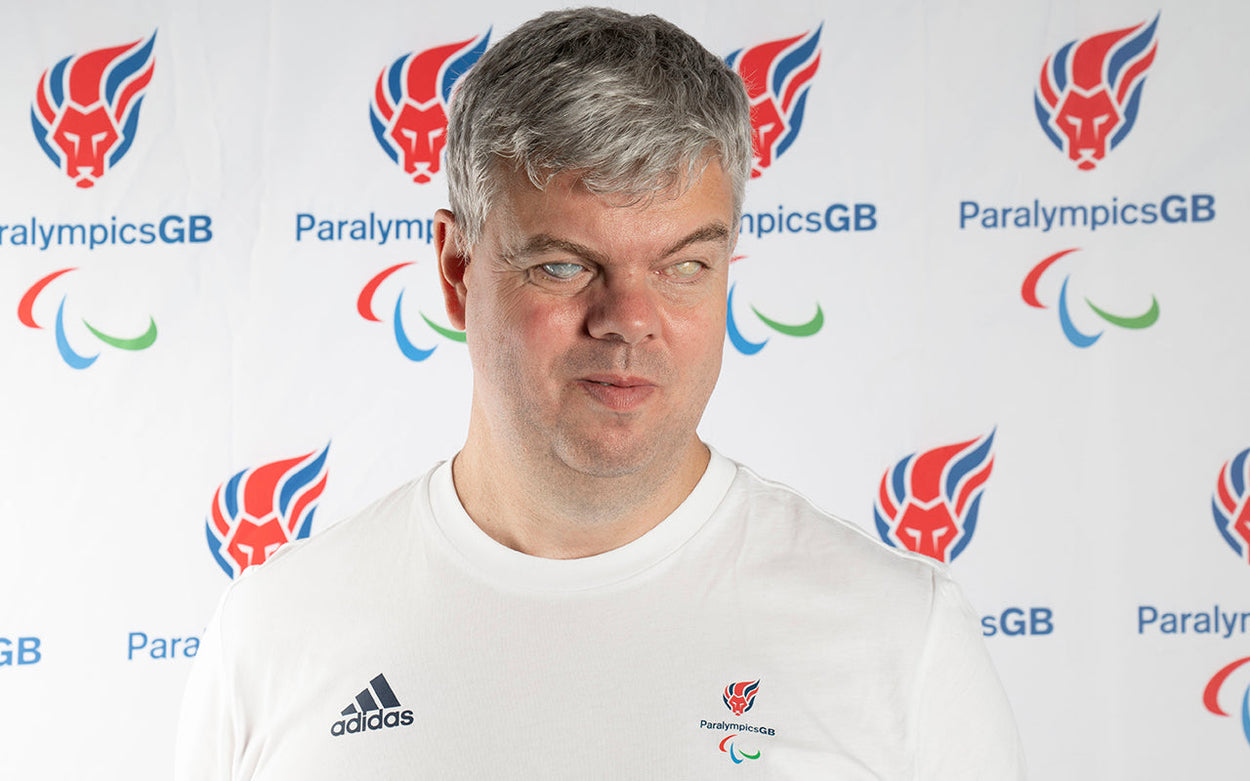David Clarke OBE is a former footballer, with 144 caps and 128 goals for England to his name. (Not to mention five silver championship medals and three Golden Boots.) Having played for the England and Great Britain blind football team, he hung up his boots in 2012, and is now chief executive of Paralympics GB. He took time out of his busy schedule to talk about blind football with us…
When did you first fall in love with football?
Well, I was born in 1970 in the northwest of England in Wigan and my parents are both Scousers and both supported Liverpool, so I fell in love with the sport of football just through the family, really, and not being given any choice. But I used to kick a ball around on the driveway with my dad, and then when I went to school, we had a teacher called Ron de la Cruz who created a football that we could play with because it had ball bearings in it. So, we could hear where it was, and that's when I started to enjoy playing football. And then when I went away to school in Worcester, that then meant that I played more competitively and that's where it kind of started really, but I’ve always been a very strong Liverpool supporter and was given no choice about the subject.
How is blind football different from the sighted game?
So it's a five-a-side game based on the game of futsal. You have four outfield players who are totally blind and then you have a goalkeeper who is fully sighted.
And the game is played on a 40 metre by 20 metre pitch and there are boards down the sides, so the ball can't run out of play down the sides, but it can run out of play down the ends.
And then the goals are I think two metres by three metres – so they're quite small goals – and the ball has ball bearings in it and the only other difference I can think of is that when you're about to tackle somebody, you have to use the word ‘voy’, which is the Spanish word for ‘I go’ which means like I'm here.
What coaching tips do you have for someone starting to play blind football?
I think the first thing is to concentrate on the kind of mobility and movement and spatial awareness and sort of running technique. So, before you even get a ball involved, I think it's important to be able to move, and be able to understand the environment around you.
The great thing about playing on a blind football pitch is that because you have the boards, you get a very strong echo that comes from either side of the pitch. So in terms of spatial awareness, you can really assess where you are at and what part of the pitch you're on, but when it comes to the ball, I think the key thing is to keep the ball under your constant control, keep the ball between your feet. You may see when blind players dribble a ball, they're kind of knocking it from toe to toe and always in permanent contact with the ball, whereas that might not be the case for a sighted player who's dribbling the ball, but that constantly knowing where it is, being in touch with the ball is really, really important.
But you know, being spatially aware and working on that – the great thing about it is it can have other benefits in terms of your wider mobility in life and you know, just navigating the streets or navigating railway stations or, you know, because you're honing it on a football pitch, you're getting much more attuned to working out what's around you.
At pub quizzes across the country people are incorrectly getting points for answering who the male footballer with the most goals for England is… Which of your 128 goals were the most memorable?
Probably the goals that the goal I scored in the Paralympics against Spain was really special, because it was the first goal at the games that we'd scored. And you know, the crowd was about 4,500, 5,000 people in the stadium and loads of people watching around the world. And it's one of the better goals I scored as well. So, I think that's definitely my one of my favourite goals.
But I also, in 2009, went to my hundred goals with a hat trick against Germany in the European Championships. So, and then I'm going to be really greedy, I scored on like a flick the ball over my head, over the defender, and turned and smashed it into the goal in 1998 in Sao Paulo in Brazil. And it's quite funny because the International Paralympic Committee President, Andrew Parsons, was the tournament director, and he remembers the goal, and no one has got footage of this goal anywhere. So, like, no one believes me, but he was there and he saw it and he admits he saw it, so I'm quite pleased about that.
But yeah, it was always special to score goals. I love scoring goals and I'm actually now back doing some coaching with the England blind football teams, men’s and women’s, so it's great to be able to try and pass on some tips to them as well.
And what’s the highlight of your sporting career so far?
I think it's actually a non-sporting moment really. I think the highlight has to be being the person who received the torch in the Paralympic opening ceremony from Joe Townsend, the Para-triathlete, and running across the stadium and handing it to the first-ever gold medal winner for Paralympics GB, which was Margaret Maughan, who won a gold in archery in 1960. And yeah, that was a super special moment. I remember the warmth of the cauldron and the tears of the crowd and it was just a crazy, crazy day and really just one of the most amazing moments. My family were in the stadium. I got so many messages from people around the world who, like, weren't expecting to see me and then suddenly did see me. It was amazing. That real feeling of community and being part of something was incredible.
Are there any other sports that you would like to try if you had time?
Well, I played international goal ball for 10 years before I played football because the football game didn't exist internationally until 1996. I also represented Great Britain athletics, believe it or not, back in 1988. So, I did do a lot of different sports, but the one sport I wish I'd given a go to much earlier with cycling because I really enjoy cycling and it would have been great fun.
If you were putting together a celebrity blind football match, who would you put on your team?
I mean, we'd have to cheat, wouldn't we? And say that David Beckham was a crossover. So, you know, we'd have to bring him in. I think maybe Ant and Dec would be good because you’d certainly know where they were all the time because they never shut up rabbiting. I think maybe a couple of Gladiators in there as well who could be big and strong and fill the goal and then we probably need, you know, like a really suave manager of some sort that could bring in the sponsors and give us relevant support and I don't know so.
How about Michael Sheen? He was nearly a footballer.
Yeah, no, he'd be very good. I mean, I'd have to take a bit more of a closer look at the Soccer Aid squad, you know, maybe get someone like Lee Mack in for the laughs, maybe.
Blind football has come a long way. What can people do to keep it growing?
Well, I think there's an awful lot of hard work going on across the football associations, particularly the English football associations that I'm involved with to provide opportunities to play, provide a pathway to play at whatever level you want to play. You know, whether that's grassroots development or moving into a sort of an international setting. So, I think it is the continuation of promoting and seeking out potential within the sport in the same way that local clubs would open their doors to any footballer.
I think it mirrors in many ways what you've seen with the women's game and girls’ football in that, you know, my local club that I coached in for 16 years, used to have one or two girls’ teams and now has girls’ teams in every year. And that's because the doors were opened and people have actively said come and join us and I think that very much needs to be the case for blind football, but I think also clubs need to realise the additionality that's required to encourage blind people to come out and play, such as how do you get from your home to the venue and how do you feel comfortable in the venue?
Have the right level of coaching that's relevant, have the right equipment, and then also get back home safely. And I really feel confident in that whole process. There’s a lot of good work going on, as I say, but the younger the better I think and getting the message out there to blind people, but parents of blind people, teachers of blind people that you know this is an option. This is possible.
If a young person or an adult is inspired by reading this to give it a go, what's the best way for them to start playing?
If they don't immediately find an option at their local club, then contact the local, the county FA and get their support in finding the appropriate club or the appropriate training opportunity that exists, because they exist up and down the country now. They can also use one of our websites at Paralympics GB – everybodymoves.org.uk – and the opportunities to do all kinds of sports will come up on there. But one of them will be football.
I think the important thing to note is there are all sorts of levels to play at. I mean it's great to aspire to being England set up and or you know Wales, Scotland, Northern Ireland set up, and even to go to a Paralympics. But actually, this is about movement. It's about social interaction with others. It's about staying healthy. It's about camaraderie and learning some technical skills, being physically fit.
It's got so much to it that, you know, I just think it's really important to step outside your door, no matter what sport it is you find to do or what activity or what form of movement you're looking to do. It's brilliant. Just to go find something. And certainly, I got so much out of blind football in my life. I was able to travel the world. I was able to meet lots of new people, make lots of new friends and it just had such a positive influence on me. My coaching, my everyday work life. It's been thoroughly enjoyable.
So yeah, take the opportunities to play with both hands and reach out if people aren't reaching out to you, then see what you can do to reach out the other way and find the opportunity.
[If you'd like to follow in David's bootprints, check out our range of audible footballs.]




